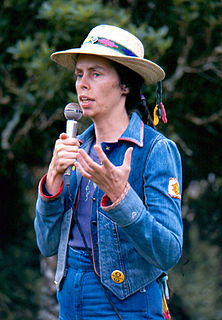A Quote by Pat Conroy
Looking around, I thought the human species was in fine shape and tried to think of something more beautiful than women and couldn't come up with a thing. The propagation of the species was a dance of total joy.
Related Quotes
It must be stressed that there is nothing insulting about looking at people as animals. We are animals, after all. Homo sapiens is a species of primate, a biological phenomenon dominated by biological rules, like any other species. Human nature is no more than one particular kind of animal nature. Agreed, the human species is an extraordinary animal; but all other species are also extraordinary animals, each in their own way, and the scientific man-watcher can bring many fresh insights to the study of human affairs if he can retain this basic attitude of evolutionary humility.
It is an odd fact of evolution that we are the only species on Earth capable of creating science and philosophy. There easily could have been another species with some scientific talent, say that of the average human ten-year-old, but not as much as adult humans have; or one that is better than us at physics but worse at biology; or one that is better than us at everything. If there were such creatures all around us, I think we would be more willing to concede that human scientific intelligence might be limited in certain respects.
There is part of a structure in which every species is related to every other species. And they're built up on species, like a pyramid. The simpler cell organisms, and then the more complicated ones, all the way up to the mammals and birds and so forth. We call it 'developing upward'... The whole thing depends on every part of it. And we're taking out the stones from the pyramid.
Most people are surprised when they hear my somber figures: we know of 2 million species of plants, animals and microorganisms, and we can give them each a scientific name and a diagnostic description. We know, perhaps generously, more than just a little bit of the anatomy in no more than 10 percent. We have done thorough studies in fewer than one-tenth of 1 percent. And the total number of species on Earth is unknown to the nearest order of magnitude.
Most people think visual information is more important than aural information - like, what's this big deal about sound? And why should I bother to listen, rather than look? And here are the facts: there are blind species, in the backs of the caves, the bottoms of the oceans. It's not essential on planet Earth to be able to see, to be a species. But there are no deaf animal species. You have to be able to hear, or you won't get the information you need in order to survive.
We ourselves are part of a guild of species that lie within and without our bodies. Aboriginal peoples and the Ayurvedic practitioners of ancient India have names for such guilds, or beings made up (as we are) of two or more species forming one organism. Most of nature is composed of groups of species working interdependently.
When I am at a dinner table, I love to ask everybody, 'How long do you think our species might last?' I've read that the average age of a species, of any species, is about two million years. Is it possible we can have an average life span as a species? And do you picture us two million years more or a million and a half years, or 5,000?
The Creator would appear as endowed with a passion for stars, on the one hand, and for beetles on the other, for the simple reason that there are nearly 300,000 species of beetle known, and perhaps more, as compared with somewhat less than 9,000 species of birds and a little over 10,000 species of mammals.
Researchers keep identifying new species, but they have no idea about the life cycle of a given species or its other hosts. They cut open an animal and find a new species. Where did it come from? What effect does it have on its host? What is its next host? They don't know and they don't have time to find out, because there are too many other species waiting to be discovered and described.






































